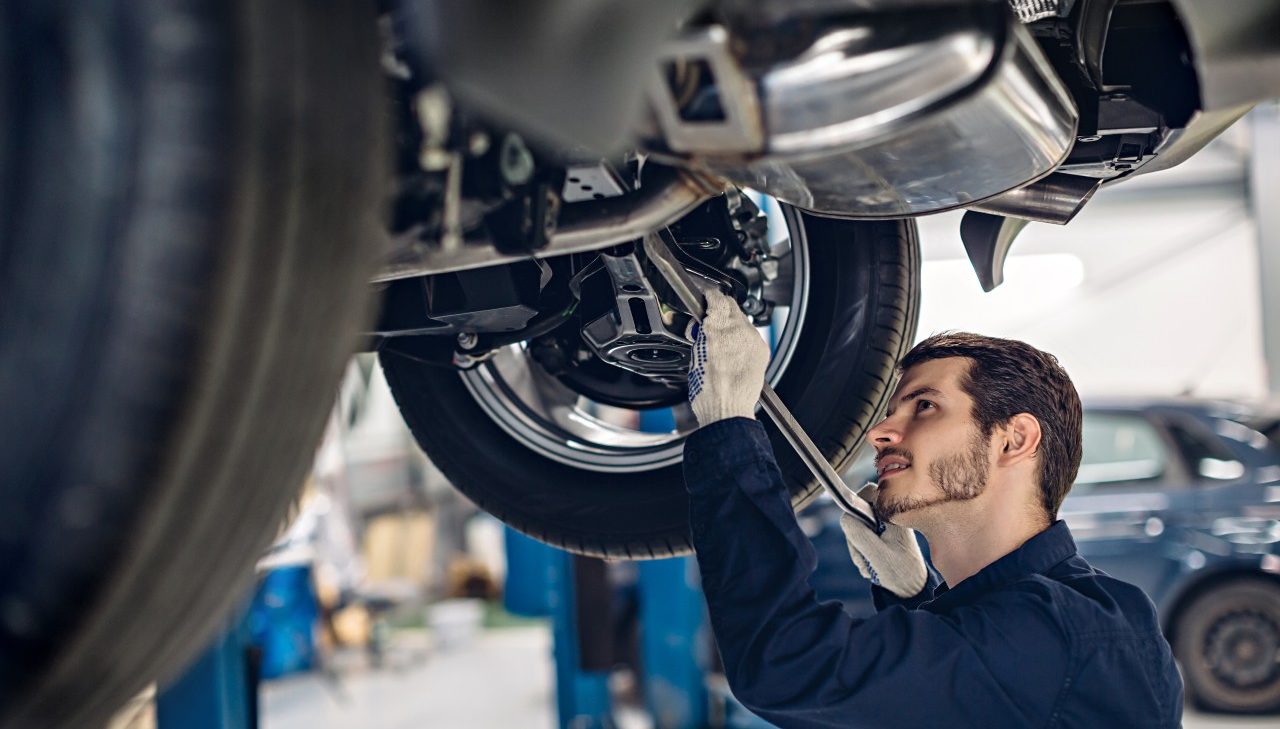How to open a mechanic shop in 9 easy steps

Key takeaways
- A thorough business plan for your auto mechanic shop will help you map out and organize all your ideas
- A limited liability company (LLC) business structure protects your personal assets and is the most logical choice for new auto repair businesses
- New mechanic shops must obtain the appropriate licenses, permits, and business insurance
There has never been a more profitable time for auto mechanics who have the entrepreneurial itch to start their own business.
Today, the average age of cars on the road is 10 years old. Drivers are holding on to their vehicles longer, which brings immense opportunity for car repair businesses. But if you’re new to entrepreneurship, you might be wondering where to start.
This step-by-step guide shows you how to open a mechanic shop. It walks through the planning stages, how to incorporate your business, and what you can do to grow your shop into a successful business.
How to open a mechanic shop
Opening a mechanic shop involves significant upfront planning. On top of that, you’ll need to ensure your business has all the requirements to operate legally. Luckily, the process doesn’t have to be too complicated. Here’s how to open a mechanic shop in nine easy steps.
1. Write a business plan
Every successful mechanic shop starts with a well-thought-out business plan. Business plans are road maps that allow you to organize your ideas and determine whether starting a mechanic shop is a feasible venture.
There are eight core sections to a mechanic shop business plan:
- Executive summary: Introduce your business idea and summarize why your business idea will work. You should also include a brief overview of other company details like your mission statement, services, number of employees, location, and a summary of financial projections.
- Company description: Go into further detail about what problems your mechanic shop solves and what type of consumers you’ll serve. Also, discuss your company’s strengths and what makes you different from other mechanic shops in your area.
- Market analysis: Examine the current state of the industry, including conducting competitive analysis. What are your competitors doing well? What are their shortfalls? Also, determine if there’s enough space in the market for another mechanic shop.
- Organization and management: Decide what type of business structure you will register as (e.g., sole proprietorship, partnership, limited liability company, or corporation). Then create an organizational chart that highlights how your company will be managed and the leadership structure of your employees.
- Service or product line: Choose the specific services your mechanic shop will provide. Will you specialize in a certain niche like transmission repair, or will you operate a general mechanic shop that services all aspects of vehicles?
- Marketing and sales: Explain the strategies you’ll use to gain new customers and retain them. Examine different marketing strategies, and choose the most effective tactics that align with your business.
- Funding request: Not all business plans need this section. However, it’s crucial if you’re seeking outside funding. Set financial projections that cover the next five years. Also, detail your startup costs, how you’ll allocate these funds, and how you intend to repay your debts.
- Financial projections: The objective is to show readers that your company will be a financial success. Support these claims with forecasted evidence, like projected income statements, balance sheets, or cash flow statements. Feel free to support these projections with graphs and charts. Also include any expenses, like specialty tool purchases, employee wages, materials, and monthly rent.
2. Choose a name and logo
A name and logo are often the first things people see about your business. These elements can set you apart from competitors and build initial trust with potential customers.
Your business name should be relevant and describe your services. Don’t leave it up for interpretation. Choose a name like “Harrison Brothers Auto Shop” or “Under the Hood Auto” rather than something that could confuse potential customers—like “Trusted Repair” or “In-and-Out Solutions”.
You should also check business registries and website domain names to ensure the name you want is available. You can check the availability of your business name when registering your business, which we’ll cover in the next section.
Invest in a sleek logo that gives your auto shop a professional image. You can use a website like 99designs or Fiverr to hire a professional freelancer to design your logo.
3. Determine your business structure
When determining how to open a mechanic shop, you need to understand how to choose a business structure. There are four different business entities to choose from for your automotive repair shop—sole proprietorship, partnership, limited liability company, or S-corporation.
However, the most fitting choice for a new mechanic shop is a limited liability company (LLC) since it combines benefits from the other types of business entities and rolls them into one.
One major benefit that LLCs provide is pass-through taxation. This means you’ll avoid being double-taxed—once on your business tax return and once on your personal return. You can simply pass earnings directly to your personal tax return without being taxed twice.
With an LLC, you also enjoy limited personal liability in the event of financial trouble or legal action. In other words, your personal assets are protected if your company goes bankrupt or an outside party sues your mechanic business.
You can find more information with our guide to registering your business or by visiting the Small Business Administration‘s website.
4. Register for taxes
After you register your business entity, you’ll need to register for state and federal taxes. In order to do so, you’ll need to obtain an Employer Identification Number (EIN).
An EIN—otherwise known as a Federal Tax Identification Number—identifies each business for tax purposes and is required by all businesses that have employees.
You can obtain an EIN on the Internal Revenue Service’s website.
5. Open a business bank account
When starting a business, keep your personal finances separate from your professional finances. It’s the only way you can protect your personal assets in the event of a financial burden or legal action.
This is where a business bank account comes into play. You can keep your financials separate and also open up the possibility of applying for business credit cards and lines of credit.
6. Purchase insurance
You’ll be assuming a lot of liability when operating an auto repair business. Get the appropriate insurance policies to legally operate your business and protect yourself in case anything should go awry. The two basic insurance policies you’ll need are general liability insurance and worker’s compensation insurance.
General liability insurance covers basic liability protection. For example, this insurance would cover expenses if you accidentally damage a customer’s vehicle.
Worker’s compensation insurance will help protect your assets if one of your employees gets injured on the job. This type of insurance covers missed wages and medical expenses if someone is injured or falls ill while working. It also prevents your employees from taking legal action against your business if an injury were to occur.
Each state has different insurance requirements for mechanic shops. Always check with your state’s vehicle department to ensure you have the proper insurance.
7. Get the necessary permits and licenses
To legally operate your business, you’ll need specific licenses and permits. Among these are state and local business licenses and permits.
Similar to insurance, each state has its own set of permit and license requirements. You can find the licensing requirements for your state on the Small Business Administration’s website.
You may also need to obtain a Certificate of Occupancy (CO) if you plan on renting or purchasing a garage for your auto repair shop. This will cover any zoning laws, building code requirements, and government regulations.
8. Establish an online presence
An established online presence will give your business exposure to new customers in your area. A professional-looking website, social media accounts, and a Yelp Business Page are great places to start.
The homepage of your website should include a unique value proposition, like “Professional auto repair services that won’t dent your wallet.” It should also have a clear call to action following this statement that directs visitors to call or email you for services.
Your site should also be segmented into the following sections:
- Home page
- Services
- Business location
- About your business
- Contact details
You can decide to design your website on your own using a platform like Wix or Squarespace or opt to hire a web developer. Hiring a professional will cost more, but it could be the best route if you’re not tech-savvy or don’t have the time to build a site.
Social media platforms like Facebook will also give your business extra exposure to people in your area. You can create a Facebook page for your business, list your business details, and create promotional posts. You can also use social media to manage relationships with clients and chat with potential customers.
An additional staple to your digital strategy should include claiming your Yelp Business Page. Your Yelp Business Page is a centralized spot where you can include your business details, respond to reviews, and add photos.
Consumers also use your Yelp Page to research customer reviews before deciding to use your business. More than 70% of consumers won’t take action unless they read reviews beforehand. Responding to customer reviews and questions is an excellent way to build customer trust and demonstrate your commitment to customer service.
9. Market your new shop
Once you have learned how to open a mechanic shop, there are plenty of ways to market your auto repair business. Beyond your website, social media channels, and Yelp Business Page, you can pursue other avenues like establishing partnerships with other businesses and email marketing.
Perhaps the quickest way to grow your business is through word-of-mouth. According to research, 86% of consumers trust word-of-mouth recommendations. An easy way to do this is by creating partnerships with other businesses that complement your services.
For example, auto dealerships and towing companies are two partnerships you can forge to increase business. These companies can refer potential clients to your auto shop and vice versa.
An effective email marketing program can also help you maintain relationships with previous customers and nurture leads. Let’s say you have a car owner who comes in for an oil change. They will eventually need to service their vehicle again at some point. Ask for their email address and permission to send them occasional promotions and discounts.
You can also include an email sign-up form on your website to capture the contact information from online visitors. You can incentivize sign-ups by offering discounted services like 20% of their first brake change or tune-up.
Launch a profitable mechanic shop
Starting your own auto repair business involves a great deal of planning if you want to build a successful shop. You’ll need to start by organizing a business plan to figure out if and how you can launch a profitable company.
Then make sure your business can legally operate, including registering your business, filing for taxes, obtaining insurance, and securing the appropriate licenses and permits. Once those tasks are complete, start searching for your first clients and leverage some of these growth strategies to get your business off the ground.
The information above is provided for educational and informational purposes only. It is not intended to be a substitute for professional advice and may not be suitable for your circumstances. Unless stated otherwise, references to third-party links, services, or products do not constitute endorsement by Yelp.

